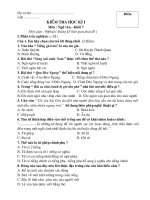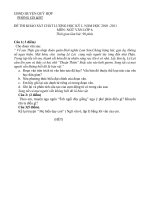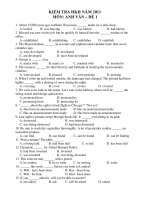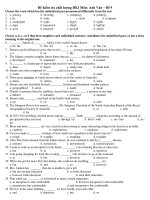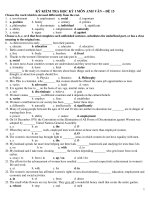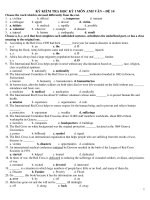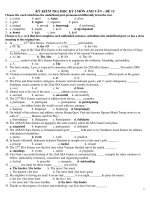KỲ KIỂM TRA HỌC KỲ I MÔN ANH VĂN – ĐỀ 10 docx
Bạn đang xem bản rút gọn của tài liệu. Xem và tải ngay bản đầy đủ của tài liệu tại đây (102.36 KB, 11 trang )
1
KỲ KIỂM TRA HỌC KỲ I MÔN ANH VĂN – ĐỀ 10
Choose the word which is stressed differently from the rest.
1. a. temperature b. serious c. awareness d. chemical
2. a. ability b. agriculture c. development d. contaminate
3. a. government b. agency c. benefit d. diversity
4. a. disappearance b. vulnerable c. conservation d. generation
5. a. current b. global c. crisis d. mankind
Choose a, b, c, or d that best completes each unfinished sentence, substitutes the underlined part, or has a
close meaning to the original one.
6. _______ is a branch of Natural Science, and is the study of living organisms and how they interact with their
environment.
a. Biology b. Biological c. Biologist d. Biologically
7. A / an _______ species is a population of an organism which is at risk of becoming extinct.
a. dangerous b. endanger c. endangered d. endangerment
8. Only a few of the many species at risk of extinction actually make it to the lists and obtain legal _______.
a. protect b. protection c. protective d. protector
9. Probability of extinction depends _______ both the population size and fine details of the population
demography.
a. on b. in c. from d. for
10. Many modern medicines are derived _______ plants and animals.
a. on b. for c. from d. in
11. 15,589 species (7,266 animal species and 8,323 plant species) are now considered _______ risk _______
extinction.
a. at / of b. on / in c. for / with d. in / at
12. Internationally, 189 countries have signed _______ accord agreeing to create Biodiversity Action Plans to
protect endangered and other threatened species.
a. a b. an c. the d. Ø
13. Known worldwide by its panda logo, World Wildlife Fund (WWF) is dedicated to protecting _______ world's
wildlife and the rich biological diversity that we all need to survive.
a. a b. an c. the d. Ø
14. WWF is _______ leading privately supported international conservation organization in the world, and has
sponsored more than 2,000 projects in 116 countries.
a. a b. an c. the d. Ø
15. Many nations have laws offering protection to these species, such as forbidding hunting, restricting land
development or creating _______.
a. agencies b. reserves c. awareness d. challenges
16. Being listed as an endangered species can have negative effect since it could make a species more desirable
for collectors and poachers.
a. awareness b. preservation c. support d. impact
17. World Wide Fund for Nature was formed to do the mission of the preservation of biological diversity,
sustainable use of natural resources, and the reduction of pollution and wasteful consumption.
a. contamination b. energy c. extinction d. development
18. The Bali Tiger was declared extinct in 1937 due to hunting and habitat loss.
a. reserve b. generation c. natural environment d. diversity
19. It is found that endangered species are often concentrated in areas that are poor and densely populated, such as
much of Asia and Africa.
a. disappeared b. increased c. threatened d. reduced
20. _______ is the existence of a wide variety of plant and animal species living in their natural environment. .
a. Biodiversity b. Conservation c. Globe d. Individual
21. She ___ be ill. I have just seen her playing basket ball in the school yard.
a. needn't b. shouldn't c. mustn't d. can't
2
22. Hiking the trail to the peak _______ be dangerous if you are not well prepared for dramatic weather changes.
You _______ research the route a little more before you attempt the ascent.
a. might / can b. may / mustn't c. can / should d. must / needn't
23. Peter has been working for 10 hours. He _______ be very tired now.
a. needn't b. must c. has to d. should
24. He is unreliable. What he says _______ be believed.
a. cannot b. must not c. may not d. might not
25. I _______ find my own way there. You _______ wait for me.
a. should / can't b. have to / must c. can / needn't d. might / mustn't
26. I was reading the book last night before I went to bed. I never took it out of this room. It ____ be lying around
here somewhere. Where ___ it be?
a. might / needn't b. can / should c. shouldn't / may d. must / can
27. When you have a small child in the house, you _______ leave small objects lying around. Such objects
_______ be swallowed, causing serious injury or even death.
a. should / must b. should not / might
c. needn't / may d. mustn't / can't
28. Frank's wallet is lying on the coffee table. He _______ it here last night.
a. must have left b. should have left
c. must be leaving d. needn't leave
29. Jenny's engagement ring was precious! It _______ have cost a fortune.
a. must b. should c. can d. needn't
30. You _______ take your umbrella along with you today. It _______ rain later on this afternoon.
a. ought to / mustn't b. needn't / will
c. will / must d. should / might
Error Identification.
31. Species become extinct or endangerment for a number of reasons, but
A (endangered) B
the primary cause is the destruction of habitat by human activities.
C D
32. Although species evolve differently, most of them adapt to a specific
A B
habitat or environment that best meets their survive needs.
C D (survival)
33. Without the particularly habitat, the species could not survive.
A B (particularly) C D
34. Such human activities as pollution, drainage of wetlands, cutting and
A B
clearing of forests, urbanization, and road and dam construction has
C D
destroyed or :seriously damaged available habitats. (have destroyed)
35. Habitat fragmentation have caused plant and animal species in the
A B (has caused) C
remaining islands of habitat to lose contact with others of their own kind.
D
Read the passage carefully and choose the correct answer.
Species that belong to an area are said to be native species. Typically, they have been part of a given
biological landscape for a long period, and they are well adapted to the local environment and to the presence of
other native species in the same general habitat. Exotic species are interlopers, foreign elements introduced
intentionally or accidentally into new settings through human activities. In one context an introduced species may
cause no obvious problems and may, over time, be regarded as being just as "natural" as any native species in the
same habitat. In another context, exotics may seriously disrupt delicate ecological balances and create a cascade
3
of unintended consequences. The worst of these unintended consequences arise when introduced species put
native species in destruction by preying on them, altering their habitats, or out-competing them in the struggle for
food resources. Although biological introductions have affected environments the world over, the most
destructive, effects have occurred on islands, where introduced insects, cats, pigs, rats, mongooses, and other
nonnative species have caused the grave endangerment or outright extinction of literally hundreds of species
during the past 500 years.
One of other reason to cause species extinction is overexploitation. This word refers to the utilization of a
species at a rate that is likely to cause its extreme endangerment or outright extinction. Among many examples of
severe overexploitation, the case of the great whales stands out in special relief. By the middle of the 20th
century, unrestricted whaling had brought many species of whales to incredibly low population sizes. In response
to public pressure, in 1982 a number of nations, including the USA, agreed to an international moratorium on
whaling. As a direct result, some whale species which are thought to have been on extinction's doorstep 25 years
ago have made amazing comebacks, such as grey whales in the western Pacific. Others remain at great risk. Many
other species, however, continue to suffer high rates of exploitation because of the trade in animal parts.
Currently, the demand for animal parts is centered in several parts of Asia where there. is a strong market for
traditional medicines made from items like tiger bone and rhino horn.
36. Native species _______.
a. are not used to the local environment
b. never get along well with other native species in the same environment
c. tend to do harm to exotic species
d. have been part of a given biological landscape for a long period
37. Exotic species _______.
a. do no harm to native species and the local environment
b. may kill native species for food
c. always share the environment peacefully with native species
d. help to make the local environment more ideal to survive
38. According to the first paragraph, _______.
a. non-native species have caused badly damage to native ones
b. introducing new exotic species to local environments is necessary
c. exotic species have never been introduced on islands
d. very few native species have been damaged by exotic species
39. According to the second paragraph, by the middle of the 20 century ___.
a. whale population was the most crowded in marine life
b. whale hunting was illegal
c. whale population increased dramatically
d. whaling was not restricted
40. Tiger bone and rhino horn _______.
a. are not popular in Asian markets
b. are never in the trade of animal parts
c. are used for making traditional medicines
d. cannot be found in Asian markets
Fill in each numbered blank with one suitable word or phrase.
The World Wide Fund for Nature (WWF) is an international (41) _____- governmental organization for the
(42) _____, research, and restoration of the environment. The organization was (43) _____ as a charitable trust on
September 11, 1961, in Morges, Switzerland, under the name World Wildlife Fund. It was an initiative of Julian
Huxley and Max Nicholson.
It is the world's largest independent conservation organization with over 5 million (44) _____ worldwide,
working in more (45) _____ 90 countries, supporting 100 conservation and environmental projects around the
world. It is a charity, with (46) ____ 9% of its funding coming from voluntary. (47) ___ by private individuals
and businesses.
4
The group says its mission is "to halt and reverse the (48) _____ of our environment". Currently, much of its
work focuses on the conservation of three biomes that contain most of the world's biodiversity: forests, freshwater
ecosystems, and oceans and coasts. Among other issues, it is also concerned (49) _____ endangered species,
pollution, and climate change. The organization (50) ____ more than 20 field projects worldwide. In the last few
years, the organization set up offices and operations around the world.
41. a. non b. not c. no d. nor
42. a. challenge b. keeping c. conservation d. awareness
43. a. produced b. discovered c. used d. formed
44. a. supporters b. residents c. inhabitants d. citizens
45. a. as b. than c. to d. as to
46. a. generally b. individually c. commercially d. approximately
47. a. deposits b. donations c. refunds d. loans
48. a. destroy b. destructive c. destruction d. destroyed
49. a. on b. by c. with d. upon
50. a. goes b. walks c. reaches d. runs
5
TEST 2
Choose the word which has the underlined part pronounced differently from the rest.
1. a. endangered b. destroyed c. damaged d. provided
2. a. attitude b. survive c. introduce d. human
3. a. medicine b. priority c. crisis d. primary
4. a. chemical b. which c. change d. each
5. a. protect b. commercial c. construction d. climate
Choose a, b, c, or d that best completes each unfinished sentence, substitutes the underlined part, or has a
close meaning to the original one.
6. Almost half of turtles and tortoises are known to be threatened with ____.
a. extinct b. extinction c. extinctive d. extinctly
7. Current extinction rates are at least 100 to 1,000 times higher than _______ rates found in the fossil record.
a. nature b. natural c. naturally d. naturalness
8. It is reported that humans are the main reason for most species' declines and habitat _______ and degradation
are the leading threats.
a. destroy b. destructive c. destructor d. destruction
9. We have to apply effective measures to save many plant and animal species _______ extinction.
a. from b. in c. for d. on
10. Over-exploitation for food, pets, and medicine, pollution, and disease are recognized _______ a serious threat
_______ extinction.
a. as / of b. to / for c. over / with d. upon / at
11. Clearing forests for timber has resulted _______ the loss of biodiversity.
a. with b. at c. in d. for
12. Humans depend on species diversity to provide food, clean air and water, and fertile soil for agriculture.
a. destruction b. contamination c. fertilizer d. variety
13. The world's biodiversity is declining at an unprecedented rate, which makes wildlife _______.
a. prosperous b. prefect c. vulnerable d. remained
14. Life on Earth is disappearing fast and will continue to do so unless urgent action is taken.
a. vanishing b. damaging c. polluting d. destroying
15. _______ is the protection of environment and natural resources.
a. Survival b. Commerce c. Conservation d. Extinction
16. Hunting for meat and burning forests for soil cause destruction to wildlife.
a. organization b. contamination c. protection d. damage
17. Toxic chemicals from factories are one of the serious factors that leads wildlife to the _______ of extinction.
a. wall b. fence c. verge d. bridge
18. Species become extinct or endangered for _______ number of reasons, but _____ primary cause is the
destruction of habitat by human activities.
a. Ø / a b. a / the c. the / a d. Ø / Ø
19. Since _______ 1600s, worldwide overexploitation of animals for _______ food and other products has caused
numerous species to become extinct or endangered.
a. the / a b. the / Ø c. Ø / the d. the / the
20. I _______ be at the meeting by 10:00. I will probably _______ take a taxi if I want to be on time.
a. must/ have to b. may / must c. should / needn't d. mustn't / shouldn't
21. You _______ forget to pay the rent tomorrow. The landlord is very strict about paying on time.
a. needn't b. mustn't c. do not have to d. may not
22. The television isn't working. It _______ during the move.
a. should have been damaged b. needn't be damaged
c. must have been damaged d. ought not be damaged
23. I am not deaf. You _______ shout.
a. must b. mustn't c. need d. needn’t
24. John failed again. He _______ harder.
6
a. must have tried b. should have tried c. can tried d. may have tried
25. _______ I borrow your lighter for a minute? - Sure, no problem. Actually, you _______ keep it if you want to.
a. May / can b. Must / might c. Will / should d. Might / needn’t
26. I do not mind at all. You _______ apologize.
a. shouldn't b. needn't c. mustn't d. oughtn't to
27. Ted's flight from Amsterdam took more than 11 hours. He _______ exhausted after such a long flight now.
a. must be b. must be being c. must have been d. should have been
28. The lamp _______ be broken. Maybe the light bulb just burned out.
a. should not b. might not c. must not d. will not
29. It is a top secret. You _______ tell anyone about it.
a. mustn't b. needn't c. mightn't d. won't
30. We have plenty of time for doing the work. We _______ be hurried.
a. needn't b. shouldn't c. mustn't d. mayn't
Choose the best sentence that can be made from the words given.
31. we I dependent / nature / cannot survive ourselves / without wildlife
a. As we are dependent on nature and we cannot survive ourselves without wildlife.
b. We dependent on nature and therefore cannot survive ourselves without wildlife.
c. We are dependent on nature and so cannot survive ourselves without wildlife.
d. We are dependent on nature and cannot survive ourselves without wildlife.
32. environmental education / help / spread / environmental awareness / share practical techniques / solve the
environmental problems
a. Environmental education to help for spreading environmental awareness and sharing- practical techniques
to solve the environmental problems.
b. Because environmental education helps to spread environmental awareness and shares practical techniques
to solve the environmental problems.
c. Environmental education helps to spread environmental awareness and shares practical techniques
to solve the environmental problems.
d. Environmental education that helps to spread environmental awareness and sharing practical techniques to
solve the environmental problems.
33. we / engage / individuals / appreciate nature / the relationship / they have with wildlife
a. We should engage individuals to appreciate nature and the relationship that they have with wildlife.
b. We might engage individuals for appreciating nature and the relationship that they have with wildlife.
c. We must engage individuals to appreciate nature and the relationship when they have with wildlife.
d. We need engaging individuals to appreciate nature and the relationship which they have with wildlife.
34. everyone / pick up / one piece of trash / a day / about 6.6 billion pieces less
a. If everyone picked up one piece of trash a day, there would be about 6.6 billion pieces less.
b. When everyone will pick up one piece of trash a day, about 6.6 billion pieces would be less.
c. Because everyone picks up one piece of trash a day, about 6.6 billion pieces is less.
d. Unless everyone picked up one piece of trash a day, there will be about 6.6 billion pieces less.
35. you / conserve energy / go to school or to work by bus / turn off your electric devices / you are not using them
a. As you want to conserve energy, go to school or to work by bus and so turn off your electric devices when
you are not using them.
b. If you want to conserve energy, go to school or to work by bus together with turn off ,your electric devices
when you are not .using them.
c. Suppose you want to conserve energy, go to school or to work by bus and turn off your electric
devices when you are not using them.
d. When you want to conserve energy, you needn't go to school or to work by bus and turn off your electric
devices when you are not using them.
Read the passage carefully and choose the correct answer.
We live in a dynamic world, and habitats are always undergoing changes at all sorts of levels. However,
natural changes usually occur at a slow pace so that impacts on individual species tend to be slight - at least in the
7
short term. When the pace of change is greatly accelerated, there may be no time for individual species to react to
new circumstances, and the effects can be disastrous. Briefly, this is the reason that rapid habitat loss is regarded
as the chief cause of species endangerment, and there is no force more powerful in this regard than human beings.
To some extent, every part of the earth has been affected by human activities, especially during this past century.
This applies on virtually every scale, from the loss of microbes in soils that once supported tropical forests, to the
extinction of fish and other aquatic species in polluted freshwater habitats, to changes in global climate caused by
the release of greenhouse gases.
From the perspective of an individual human lifetime, such changes may be hard to detect and their effects
on individual species may be hard to predict. But the lesson is clear enough. For example, although many
countries have had plans to grow many tropical forests, they are highly susceptible to destruction because the
soils in which they grow are poor in available nutrients. Centuries may be required to bring back a forest that was
cut down or burnt out in the space of a few years. Many of the world's severely threatened animals and plants live
in such forests, and it is certain that huge numbers of them will disappear if present rates of forest loss continue.
36. Habitats in the world are unchangeable and fixedly exist.
a. True b. False c. No information
37. All species can adapt themselves to new circumstances easily and quickly.
a. True b. False c. No information
38. Human beings are the main cause that leads to rapid habitat loss.
a. True b. False c. No information
39. Many kinds of fish are also in danger of extinction because water habitats are polluted.
a. True b. False c. No information
40. Many countries have grown as many tropical forests as they destroyed in the past years.
a. True b. False c. No information
Fill in each numbered blank with one suitable word or phrase.
When the word "endangered" is mentioned, people usually think of particular species, like the panda or
whooping crane. However, we would like to encourage you to think about (41) ____ in a broader context. It is
(42) ___, the physical places where species live and interact with one another. Although the development of
special breeding programs, also known as captive conservation, may help some species in some cases, it is clearly
not (43) ___ answer to the global problem. Indeed, (44) __ we are able to protect natural areas where endangered
species actually live, they have no future. .
Species become endangered for a wide (45) _____ of reasons. By analyzing and grouping many individual
cases, however, we find the same broad causes (46) _____ again and again. They are Habitat Destruction, Exotic
Species, and Overexploitation. Among other factors threatening particular species are limited: distribution,
disease, and pollution. Limited distributions are often a consequence of other threats: populations confined to one
or a few small areas because of habitat (47) _____, for example, may be disastrously affected by random factors.
Diseases can have severe (48) _____ on species lacking natural genetic protections against particular pathogens,
like the rabies and canine distemper viruses that are currently devastating carnivore populations in East Africa.
Domestic animals are usually the reservoirs of these and other diseases affecting wild (49) _____, showing once
again that human activities lie at the root of most causes of endangerment. Pollution has seriously done harm (50)
_____ number of terrestrial species, although species living in freshwater and marine ecosystems are also
suffering.
41. a. development b. endangerment c. pollution d. contamination
42. a. plants b. conservations c. habitats d. organizations
43. a. a b. an c. the d. Ø
44. a. so b. but c. if d. unless
45. a. variety b. commerce c. extinction d. destruction
46. a. expressing b. showing c. disappearing d. appearing
47. a. benefit b. reserve c. loss d. gone
48. a. impact b. interest c. infection d. absorption
49. a. needs b. populations c. natures d. medicines
50. a. to b. for c. with d. at
8
TEST 3
Choose the word which is stressed differently from the rest.
1. a. extinction b. animal c. classify d. primary
2. a. biologist b. seriously c. commercial d. identify
3. a. habitat b. different c. industry d. introduce
4. a. medicine b. endanger c. addition d. survival
5. a. derive b. provide c. modern d. depend
Choose a, b, c, or d that best completes each unfinished sentence, substitutes the underlined part, or has a
close meaning to the original one.
6. They eventually realize that reckless _______ of the earth's resources can lead only to eventual global
disaster.
a. exploit b. exploitable c. exploitation d. exploitative
7. Farmers make their soil more productive by distributing _______.
a. fertile b. fertility c. fertilizers d. fertilizable
8. Chemical wastes from factories are _______ that cause serious damage to species habitats.
a. pollutes b. pollutants c. pollutions d. polluters
9. Contamination and global warming have driven many species of animals and plants _______ the threat of
extinction.
a. for b. to c. with d. on
10. Although we are aware _______ the importance of environment, we still overexploit it.
a. from b. on c. for d. of
11. They have built a particular reserve' which is suitable _______ pandas.
a. at b. upon c. in d. for
12. We should do something immediately to conserve _______ nature
a. a b. an c. the d. Ø
13. Everyone knows what is happening to _______ earth but we just do not know how to stop it.
a. a b. an c. the d. Ø
14. Many species have become extinct each year before biologists can identify them.
a. destroy b. drain c. endanger d. discover
15. If an area is _______, all the trees there are cut down or destroyed.
a. endangered b. deforested c. contaminated d. polluted
16. Humans depend on species diversity to provide food, clean air and water, and fertile soil for agriculture.
a. raise b. produce c. supply d. reserve
17. Many schools provide environmental education to increase students' awareness of conservation needs.
a. effort b. benefit c. exploitation d. knowledge
18. All the countries of the area have _______ to protect their wildlife but they are rarely enforced.
a. efforts b. laws c. results d. reserves
19. Forest dwellers had always hunted the local _______ but their needs had been small.
a. wildlife b. commerce c. reserve d. generation
20. Keep quiet. You _______ talk so loudly in here. Everybody is working.
a. may b. must c. might d. mustn't
21. John is not at home. He _____ go somewhere with Daisy. I am not sure.
a. might b. will c. must d. should
22. _______ I have a day off tomorrow? - Of course not. We have a lot of things to do.
a. Must b. Will c. May d. Need
23. The computer _______ reprogramming. There is something wrong with the software.
a. must b. need c. should d. may
24. _______ I be here by 6 o'clock? - No, you _______.
a. Shall/mightn't b. Must / needn't c. Will / mayn't d. Might / won't
25. If I had gone white water rafting with my friends, I _______ down the Colorado River right now.
a. should have floated b. must be floating
9
c. would be floating d. would have been floating
26. You _______ touch that switch, whatever you do.
a. mustn't b. needn't c. won't d. wouldn't
27. Susan ___ hear the speaker because the crowd was cheering so loudly.
a. mustn't b. couldn't c. can't d. needn't
28. You _______ be rich to be a success. Some of the most successful people I know haven't got a penny to their
name.
a. needn't b. couldn't c. mayn't d. mustn't
29. - Oh no! I completely forgot we were supposed to pick Jenny up at the airport this morning.
- She _______ there waiting for us
a. needn't sit b. might still sit c. must still be sitting d. should have sat
30. Jane often wears beautiful new clothes. She _______ be very rich.
a. must b. could c. might d. needn’t
Choose a, b, c, or d that best fills in the blank.
31. I have done this math problem at least twenty times, but my answer is wrong according to the answer key.
_______
a. The answer in the book should be wrong!
b. The book needn't have a wrong answer.
c. There is a wrong answer in the book.
d. The answer in the book must be wrong!
32. When I was a child, as we were having dinner, my grandmother always used to say, “_______.”
a. One must not eat with one's mouth open
b. You should have eaten with your mouth open.
c. Open your mouth and eating
d. One needn't open his mouth to eat
33. _______ We have still got plenty of food.
a. You should have bought some more to eat.
b. You needn't have gone to the supermarket.
c. We must have bought some more food.
d. May I go to the supermarket?
34. John passed his exam with a distinction. _______.
a. He was too lazy to succeed b. He can't have studied very hard
c. He must have studied very hard d. He needs studying harder
35. _______. We got there far too early.
a. We needn't have hurried b. We should hurry up
c. Hurry up or we will be late d. We must have walked hurriedly
Read the passage carefully and choose the correct answer.
By the year 2025, the Earth could lose as many as one fifth of all species known to exist today. In recent
centuries, hundreds of species have disappeared, almost always as a result of human activities. The passenger
pigeon, one familiar example, was a source of food until excessive hunting and habitat loss caused its extinction
in 1914. The North American bison, whose populations were decimated by settlers and market hunters in the
1800s, came close to sharing the same fate. Bison survive today only because of the efforts of early
conservationists.
Today, species require such efforts more urgently than ever. An essential task that falls to present-day
conservationists is to determine which species are most, endangered, so that conservation resources' can be
applied where action is needed most. Species are categorized by the degree to which their survival in the wild is
threatened. World Wildlife Fund offers a sampling of animals and plants that fall mainly within the two most
serious categories of- threat: critically endangered and endangered. What threatens these species' existence? Some
of the top threats are habitat destruction by unsustainable logging and ever-encroaching human settlement;
pollution of water, soil, and air by toxic chemicals; unnatural climate changes due to fossil fuel use; unmanaged
fishing that exhausts fish stocks; and illegal hunting to supply the demand for skins, hides, traditional medicines,
10
food, and tourist souvenirs. The list which conservationists presents only a fraction of the species at risk of
extinction today and does not include thousands of species whose status we do not yet know. Hundreds of species
without common names have been left out, which means that while many mammals are on this list, only a few
insects and mollusks are included.
Species listed here range from the largest animal on Earth, the blue whale, to the majestic tiger, to the humble
thick-shell pond snail. Large or small, beautiful or ugly, all species play a role in the complex circle of life. All of
us depend on the natural resources of our planet. Each time a species is lost, the complexity, natural balance, and
beauty of our world is diminished. And what threatens plants and animals ultimately threatens people as well.
36. According to the first paragraph _______.
a. species extinction is only caused by hunting
b. human beings protect wife life much more than they do harm to them
c. the main cause of species extinction is human activities
d. we can stop radically species extinction by 2025
37. The North American bison _______.
a. was completely extinct in 1800s
b. was not the aim of human hunting
c. was raised by settlers in 1800s
d. has escaped from extinction thanks to conservationists
38. Species are categorized _______.
a. to prevent hunting b. to provide food
c. to destroy their habitats d. to give preferential right to conserve
39. Which sentence is true?
a. Medicine is not a factor to cause species extinction.
b. The list which conservationists present does not include all kinds of species.
c. Pollution does nothing to species extinction.
d. Conservationists have good knowledge of all kinds of mollusks.
40. According to the last paragraph, _______.
a. species extinction has no relationship to human beings
b. what threaten plants and animals can do nothing to human beings
c. human beings depend on natural resources to survive
d. not every, species has a role in the circle of life.
Fill in each numbered blank with one suitable word or phrase.
Nearly 200 of the 1500 native plant species in Hawaii are at risk of going extinct in the near future because
they have been (41) _____ to such low numbers. Approximately 90 percent of Hawaii's plants are found nowhere
else in the world but they are (42) _____ by alien invasive species such as feral goats, pigs, rodents and non- (43)
_____ plants.
The Hawaii Rare Plant Restoration Group is striving to (44) _____ the extinction of the 182 rare Hawaiian
plants with fewer than 50 individuals remaining in the (45) _____. Since 1990, (46) _____ a result of their 'Plant
Extinction Prevention Program', sixteen species have been brought into (47) _____ and three species have been
reintroduced. Invasive weeds have been removed in key areas and fencing put up in order to (48) _ plants in the
wild.
In the future the Hawaii Rare Plant Restoration Program aims (49) _____ collecting genetic material from the
remaining plants in the wild for storage as a safety net for the future. They also aim to manage wild populations
and where possible reintroduce species into (50) _____
41. a. disappeared b. reduced c. increased d. developed
42. a. guarded b. invested c. conserved d. threatened
43. a. nation b. native c. national d. nationally
44. a. prevent b. encourage c. stimulate d. influence
45. a. wild b. atmosphere c. hole d. sky
46. a. so b. due c. as d. but
47. a. contamination b. production c. cultivation d. generation
11
48. a. derive b. vary c. remain d. protect
49. a. at b. for c. with d. on
50. a. shelters b. reserves c. gardens d. halls

